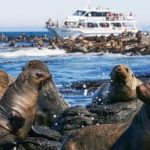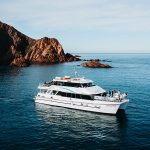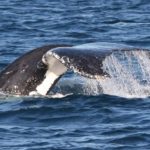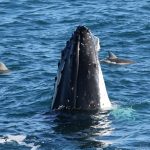Whale Song
The Humpback whale sings, and its song is both haunting and beautiful. They sing complex arias that ride the ocean currents for long distances, and once the song is finished, they start again in a continuous rondo, bearing secrets that only they can understand. Researchers are unsure why they sing but they know only the male does so.
The songs could be a territorial display, warding off competing males, or perhaps a serenade to potential mates, a ‘Love Me Tender’ in whale-speak.
Each Humpback population has its own song, give or take minor variations. Every few years, the songs change; on occasion, phrases and notes are exchanged with other populations of Humpbacks, encountered in common feeding grounds. Given that the songs remain in a state of stasis for many years (until the decision is made to change it for whatever reason that only the Humpback knows), the message in the song must bear great significance, especially in relation to their survival.
In terms of the acoustic capacity of different animals, the singing ability of Humpbacks is a sophisticated adaptation. It suggests the presence of complex neural processes not unlike hominids. Indeed, researchers have found cells in the brains of Humpbacks that are the same as humans. These cells, called spindle cells, are related to cognitive function, suggesting that their capacity for sentience may not be so different from ours.
Humans, however, have not always been kind to the Humpback. Like many other whale species, they were hunted to near extinction during the heyday of whaling. But today, we can make amends through both protective measures and eco-tourism ventures that give people the opportunity to experience their spectacular majesty, in addition to their exhibitions of sentience.
During their northern migration from Antarctica to breed in the warmer waters of Queensland and northern NSW, the Humpback journeys past the waters surrounding Phillip Island. Here, the Humpback gives glimpses of that sentient behaviour, swimming up to boats out of curiosity.
Vessels must always maintain a prescribed distance from whales, even with a special permit, but often whales approach out of their own volition. This has happened a number of times during the Winter Whale cruises offered by Wildlife Coast Cruises. And with the number of whale visits to the area increasing every year, it will no doubt happen again in 2019.

Wildlife Coast Cruises offers daily cruises during the winter whale season between June and August. Currently, a special discount for adult fares is available for early bird bookings made before May 20th. Additionally, there is the new Whale Season Pass, which includes 5 trips on the Winter Whale Cruise or Dolphin & Whale Cruise. Information about the passes can be found here. For early bird discounts, book online via the website, or call the booking office on 1300 763 769.
Beside the Humpback, Southern Right whales and Orcas are also frequent visitors to the Island during the season … but that is another whale tale …. so, stay tuned.
← Back to Latest News Call us on (03) 5952 9500
Call us on (03) 5952 9500





